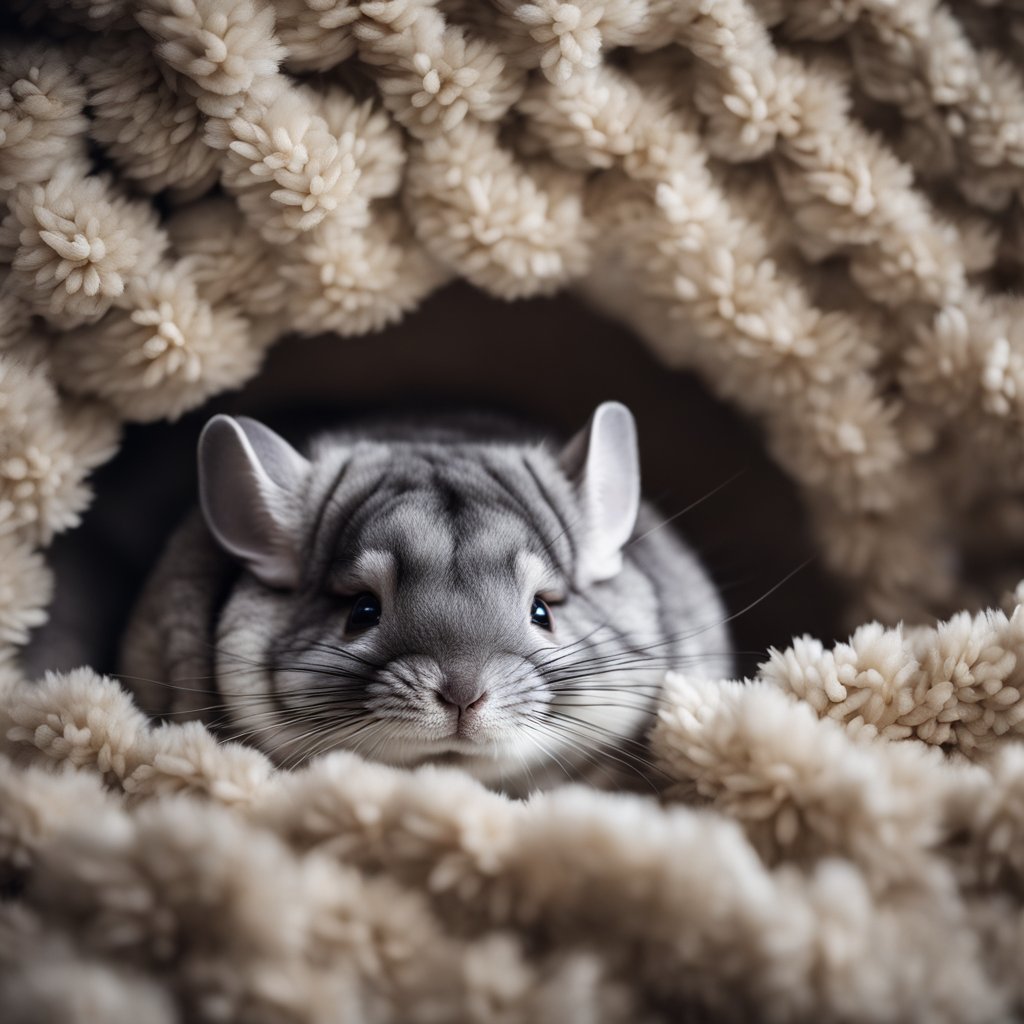Chinchillas are fascinating creatures with unique sleeping habits. You might be surprised to learn that chinchillas can sleep with their eyes open. This behavior helps them remain alert to potential threats while they rest. By contracting the muscles in their irises, they can block out light without fully closing their eyelids.

Understanding how chinchillas sleep can help you provide better care for your pet. Knowing when they are most active and how they manage their sleep can provide insight into their needs and behaviors. As you learn more about these nocturnal animals, you’ll appreciate their intriguing nature even more.
Key Takeaways
- Chinchillas have the ability to sleep with their eyes open.
- They are mainly active during the evening and night.
- Sleep patterns can vary between open-eyed and closed-eyed rest.
Chinchilla Sleep Patterns

Chinchillas have unique sleep patterns that are crucial for their well-being. Understanding these patterns can help you provide better care for your pet.
Sleep Cycles of Chinchillas
Chinchillas generally sleep in blocks that can last up to 12 hours. They tend to wake only to eat, drink, or eliminate waste. Most of their sleeping occurs during the day, making them crepuscular, which means they are most active during dawn and dusk.
In captivity, chinchillas will adapt their routines based on light exposure. Providing a consistent light cycle with about 12 hours of light and 12 hours of darkness helps maintain their natural sleeping habits. This rhythm is essential for their health and mood.
Nocturnal Activity
Chinchillas are primarily nocturnal animals. They are most lively and active during the night. This activity level is essential for their physical and mental health.
During the evening hours, you may notice your chinchilla jumping around, playing, or exploring its environment. This is their time to engage and interact with their surroundings. Keeping a stimulating habitat with toys and climbing opportunities is important. It encourages exercise and reduces boredom.
This nighttime routine is critical for the chinchilla’s social behavior. They thrive in an engaging environment, especially when you are around to play with them!
Eye Functionality During Sleep

Chinchillas have unique eye functionalities that play a crucial role in their sleep patterns. Understanding how their eyes work during rest can provide insight into their behavior and adaptations.
Physiology of Chinchilla Eyes
Chinchillas possess large, expressive eyes that are primarily adapted for their crepuscular nature. These eyes have a layer of tissue called the tapetum lucidum, which enhances night vision by reflecting light back through the retina. This adaptation allows them to see well at dawn and dusk when they are most active.
When chinchillas sleep, they may not fully close their eyes due to a unique ability to control their pupils. They can contract the muscles in their irises to limit light entry without shutting their eyelids. This allows them to remain alert to potential dangers while resting.
Adaptations for Survival
Sleeping with their eyes open or partially open is a survival strategy for chinchillas. In the wild, keeping their eyes open helps them detect predators while minimizing movement. This vigilance is vital since they are prey animals in their natural habitat.
Chinchillas have a polyphasic sleep pattern, dividing their sleep into short cycles throughout the day and night. They take frequent naps instead of one long sleep period. This behavior helps them remain aware and adapt to their surroundings more effectively.
Additionally, this eye functionality supports their social interactions. By observing their environment during rest, chinchillas can quickly respond to disturbances, ensuring their safety.
Resources
For more information about chinchilla sleeping habits, you can explore detailed resources. Websites like Chinchilla Haven and Love My Chinchilla provide insights into their unique behaviors and adaptations. Understanding these details contributes to better care and awareness as a chinchilla owner, ensuring your pet’s needs are met.
Frequently Asked Questions

You may have several questions about chinchillas and their sleeping habits. Understanding how these animals rest can help you provide better care for your pet.
How can you tell if a chinchilla is asleep if their eyes are open?
When a chinchilla sleeps with its eyes open, look for other signs of sleep. Their body will be relaxed, and they may not respond to sounds or movements as quickly. Additionally, their breathing may become slower and more rhythmic.
Is it normal for chinchillas to sleep with their eyes partially open?
Yes, it is normal for chinchillas to sleep with their eyes partially open. They can tighten the muscles around their irises, allowing them to block light without closing their eyelids. This behavior is typical among chinchillas and allows them to remain aware of their surroundings.
Do chinchillas need a dark environment to sleep properly?
Chinchillas do not strictly need a dark environment, but they prefer a calm and dim space for sleeping. They are crepuscular animals, meaning they are most active during dawn and dusk. Providing a quiet area may help them feel more secure while resting.
What are the sleeping habits of chinchillas in captivity?
In captivity, chinchillas tend to sleep during the day and become active in the evening and nighttime. They often sleep curled up in small spaces like nest boxes. Keeping a consistent routine can help them feel more comfortable and secure.
How does the sleep behavior of chinchillas differ from other rodents?
Chinchillas have unique sleeping behaviors compared to many other rodents. While most small rodents sleep with closed eyes, chinchillas can sleep with their eyes open. This adaptation helps them remain alert to potential dangers in their environment.
Can the way a chinchilla sleeps indicate its health or comfort level?
Yes, a chinchilla’s sleeping position can reflect its health or comfort. If your chinchilla frequently sleeps in unusual positions or seems restless, it may be a sign of stress or discomfort. Observing their sleeping patterns can help you identify any issues that may require attention.

